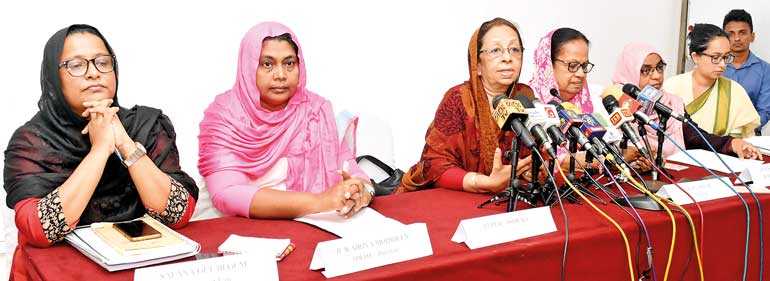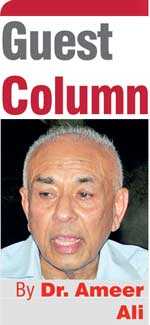Friday Feb 13, 2026
Friday Feb 13, 2026
Thursday, 1 August 2019 00:20 - - {{hitsCtrl.values.hits}}

The All Ceylon Jamiyyathul Ulama (ACJU) once again is reported to be working behind the scenes to sabotage the proposed amendments to the Muslim Marriage and Divorce Act (MMDA) as recommended by the Justice Saleem Marsoof (JSM) committee.
After almost a decade of investigation and consultation with different groups and individuals including Muslim women, JSM came out with a set of recommendations, which even though did not go far enough to cover all the complaints against the Act by Muslim women, yet were a commendable achievement. 
ACJU immediately decided to sabotage the report and instigated a few members of the JSM committee to do its dirty work. With counter recommendations from these saboteurs, Muslim parliamentarians who needed the support of ACJU for their political survival dillydallied and eventually caved in. This led to further delay.
However, after extended discussions and compromises, when those parliamentarians finally accepted some of the recommendations on 11 July this year and decided to recommend them to the parliament, ACJU once again showed its devilish intentions.
This prompted a Muslim women collective to hold a media conference on 26 July demanding the immediate implementation of the reforms. With a Government in disarray, and its Muslim ministers and deputies both in and out of their portfolios, the chances are that MMDA reforms will not see the light until the next government comes into office. ACJU will do all it can to cause further delay.
Before reforming MMDA Muslims must reconstitute ACJU. In an earlier piece that CT published on 19 February this year, I said the following: “ACJU’s intellectual fortress is built with bricks of shari’a, fiqh and madhab. Is this fortress (so) impregnable for modern ideas on women, marriage, divorce and family to enter and reshape its structure? Historically speaking, there had been a creative tradition in Islam of discursiveness, disagreements, controversies and compromises in shaping those bricks and that tradition is not closed except in the mind of ACJU hierarchy. Muslim women of the era when … madhahib (plural for madhab) derived their fiqh laws in relation to marriage and divorce were not the women of today. Today, they are more educated, more independent, more professional, and therefore they are a significant component of the nation’s labour force. They are not a piece of property to be protected, (bought) and sold. An intentional reading of the Quran and researches by erudite Muslim women about the actual status accorded to them in Islam is totally contradictory to what the guardians of orthodoxy are advocating. Had ACJU been a forward looking institution changes to fiqh would have originated much earlier from within that apex body. Unfortunately, its retrogressive outlook and intellectual stagnation have force the demand for reforms to come from outside.”
ACJU, like other such organisations all over the Muslim world, has monopolised the name ulama, and restricted its usage only to denote those who have been educated and trained in the traditional madrasas and officiating as religious functionaries. They have thus evolved into a self-appointed priestly class for which there is no provision in Islam.
The name ulama is the plural for alim, which simply means a learned person. In its plural form that word occurs only twice in the Quran, in chapters 26:197 and 35:28. In the latter context, if one cares to read the verse that proceeds 35:28, one would understand that ulama covers intellectuals with expertise in other fields also. Therefore ACJU should be reconstituted to include learned people from other intellectual disciplines who are also knowledgeable in Islamic history and exegesis of Holy texts.
As it is, ACJU represents what that great poet of Pakistan, Muhammad Iqbal called the mullahs. It is better to rename ACJU more appropriately as All Ceylon Jamiyyathul Mullahs (ACJM). A number of issues on which the community is currently facing criticism from outsiders could have been avoided had this institution included intellectuals with a capacity to approach and analyse problems from different angles.
Marriage is not religious but a social institution, and strictly speaking no mullah is required to consummate a Muslim marriage. The parents of the couple and a witness are all that required for the purpose. However, in Sri Lanka the roots of MMDA are the Muslim marriage customs and traditions that remained unchanged for centuries but were compiled early in the 19th century by the British in consultation with Muslim chiefs in and around Colombo. The model for this compilation was already set by the Dutch in Batavia.
All those customs and traditions were sanctified with some religious colouring as understood and interpreted from the Quran and Sunnah by a class of madrasa trained religious functionaries, who were all males and whose knowledge on social issues and a society’s progress remained extremely static and confined to what was indoctrinated to them in madrasas.
Muslim women did not have and were not allowed to have any say in one of the most important stages of growth in their life. MMDA of 1951 reflected this state of affairs. Amendments introduced later were mostly procedural than fundamental. However, since that Act came into effect, and thanks to the spread of modern education, growth of literacy and opening of opportunities for employment, the status of Muslim women began to change.
As a result, there is at present a class of educated, independent and professional Muslim women who understand the meaning of justice and equality in Islam better than the so called religious functionaries under the control of ACJU. In essence, the struggle for reforming MMDA is a struggle between two different classes, one represented by ACJU and its political backers with a backward looking static social model, and the other represented by intellectual and professional men and women whose idea of Islam and progress is forward looking and dynamic.
Women are the future of Islam, as Sherin Khankan has titled her ‘memoir of hope’ (London: Rider, 2017). They have begun to interpret the holy text to understand its original message to liberate women from an environment in which daughters were buried alive. Although their status has improved since then there is yet a lot to change.
To liberate women one has to first liberate the Quran from its male interlocutors. This is happening all over the world. It makes one shudder to think for example, that in Saudi Arabia, the fortress of ultraconservative Wahhabism, which ideology recently seems to have infiltrated into the thinking of ACJU hierarchy, the ulama produced more than 30,000 fatwas or religious rulings on women, illustrating the extent of male dominance over women affairs in the name of Islam (Madawi Al-Rasheed, A Most Masculine State, Cambridge University Press, 2013, p. 112). This may be an extreme case, but it shows how patriarchy seeks to control women in Muslim societies.
The demand for reforming MMDA is only the beginning of Muslim women’s liberation struggle. Madrasas have been in existence in this country for more than a century. Have they produced a single female religious scholar to be recognised as a member of the so called ulama community, let alone be allowed to join ACJU? Are women allowed to pray in the mosques and join in daily congregations? Is it not time for mosques in Sri Lanka to provide separate facilities for women worshippers, as found in other countries?
All this needs progressive thinking on the part of Muslim leaders, which ACJU lacks. This is why the reconstitution of ACJU to include experts from other disciplines has become imperative.
(The writer is attached to the School of Business and Governance, Murdoch University, Western Australia.)